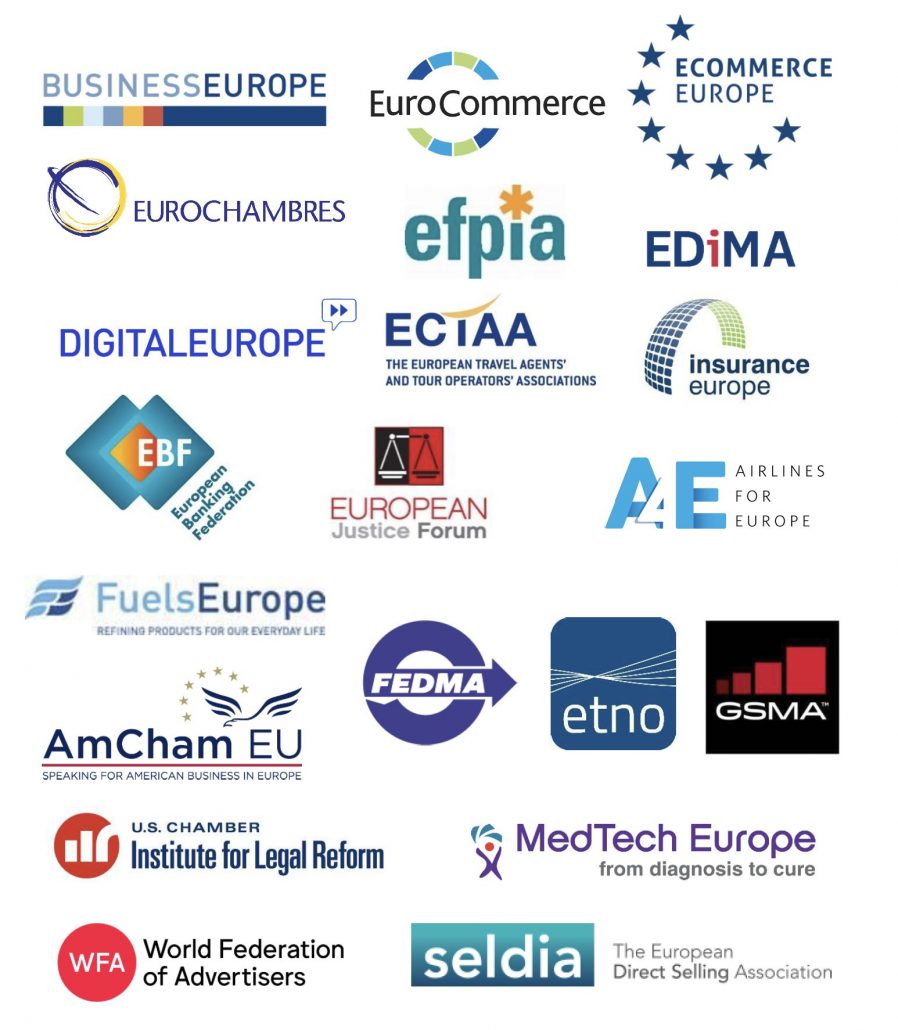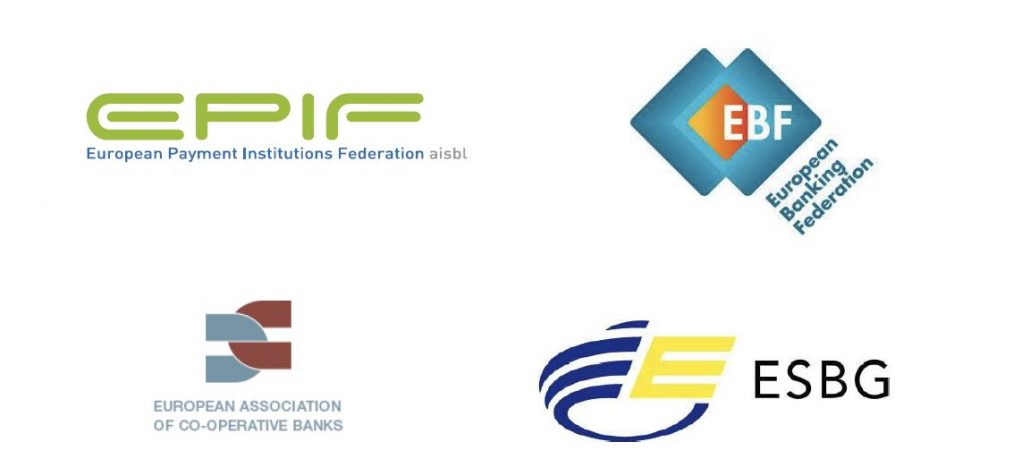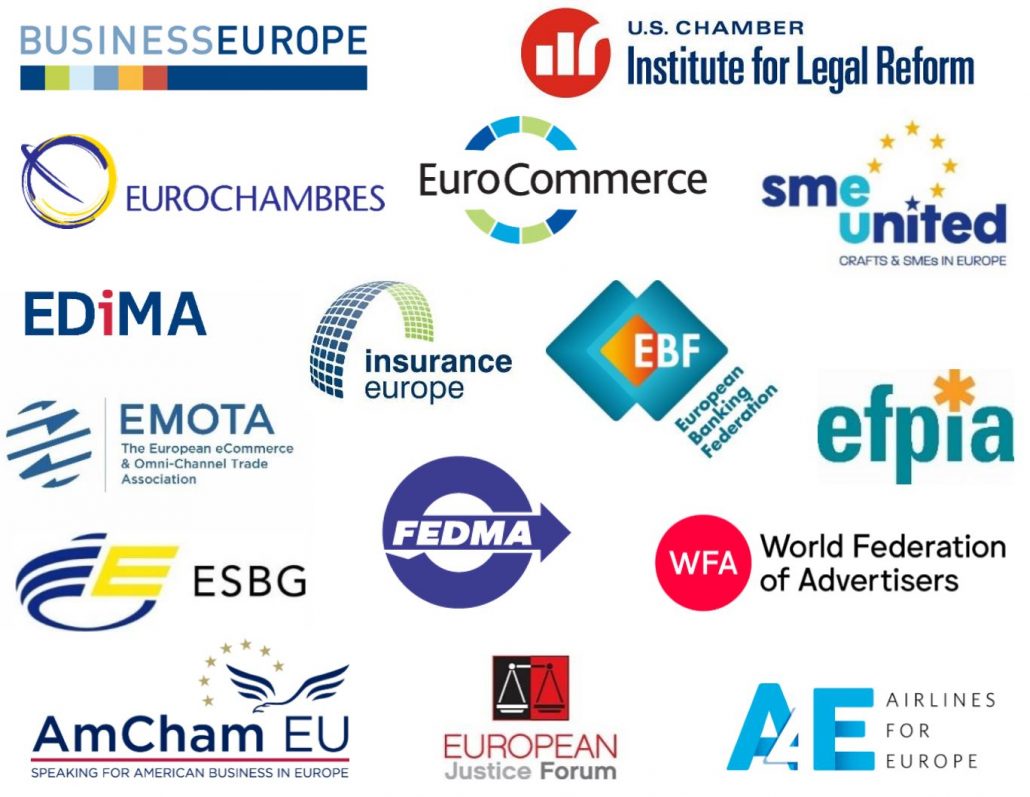
Brussels, 12 November 2019
Joint Business Statement on the Proposal on Representative Actions
The European business community is following with interest and concern the progress of the Proposal for a Directive on Representative Actions before the Council.
The members of our organisations support simple, balanced and efficient civil justice systems. This Proposal presents an opportunity to achieve an EU framework which offers consumers appropriate redress while facilitating trade between Member States by reducing the divergences between Member State’s private enforcement systems. It also presents an opportunity to minimize the risk of abuse, especially the risk that consumers harmed by a breach of consumer protection laws may be re-victimized by unscrupulous actors while trying to enforce their rights.
Contact:
Blazej Blasikiewicz, B.Blasikiewicz@ebf.eu
Nahuel Mercedes, +32 (0)2 508 3748, n.mercedes@ebf.eu
Latest posts
- EU T+1 Industry Committee launches roadmap and opens consultation period for capital markets transformation
- European Credit Sector Associations welcome efforts to strengthen European retail payments
- The EU T+1 Industry Committee finalises High-Level Road Map
- Vacancy: Innovation and Cybersecurity Trainee
- New study stresses urgent need for regulatory capital efficiency
Subscribe to the EBF Weekly + FinReg Agenda
Every Friday at noon you can receive the EBF Weekly + Financial Regulation Agenda. This agenda presents an overview of upcoming European and international meetings and conferences in financial regulation, as well as important general financial and economic events and key EBF meetings for the week ahead. CLICK HERE TO SUBSCRIBE
Subscribe to the EBF Morning Brief
The EBF Morning Brief is published Monday through Friday morning and brings you the top banking headlines, relevant announcements from the EU institutions and the latest from the EBF and its members, national banking associations in 32 countries in Europe. CLICK HERE TO SUBSCRIBE
The post Joint Business Statement on the Proposal on Representative Actions appeared first on EBF.
]]>‘Don’t drop the ball on trans-Atlantic cooperation’
American Banker publishes article by Wim Mijs, Chief Executive Officer of the EBF
Article by Wim Mijs, CEO of the European Banking Federation
.
Washington DC, 17 May 2019
.
American Banker, a leading U.S. trade publication covering the financial services industry, has published an op-ed article by Wim Mijs, Chief Executive Officer of the European Banking Federation, about the importance of maintaining trans-Atlantic cooperation in the field of financial regulation. The article appeared in its BankThink section, American Banker’s platform for informed opinion about the ideas, trends and events reshaping financial services.
“Now that the 2008-9 financial crisis is more than a decade behind us, it might be tempting to overlook the benefits of international cooperation in financial regulation, particularly between Europe and the United States. Let’s not yield to that temptation.”
CLICK HERE to read the rest of the article.
Latest posts
- EU T+1 Industry Committee launches roadmap and opens consultation period for capital markets transformation
- European Credit Sector Associations welcome efforts to strengthen European retail payments
- The EU T+1 Industry Committee finalises High-Level Road Map
- Vacancy: Innovation and Cybersecurity Trainee
- New study stresses urgent need for regulatory capital efficiency
Subscribe to the EBF Weekly + FinReg Agenda
Every Friday at noon you can receive the EBF Weekly + Financial Regulation Agenda. This agenda presents an overview of upcoming European and international meetings and conferences in financial regulation, as well as important general financial and economic events and key EBF meetings for the week ahead. CLICK HERE TO SUBSCRIBE
Subscribe to the EBF Morning Brief
The EBF Morning Brief is published Monday through Friday morning and brings you the top banking headlines, relevant announcements from the EU institutions and the latest from the EBF and its members, national banking associations in 32 countries in Europe. CLICK HERE TO SUBSCRIBE
The post Don’t drop the ball on trans-Atlantic cooperation – Wim Mijs appeared first on EBF.
]]>Joint Finance Sector Social Partners Statement on Covid-19

Brussels, 30 March 2020
Joint Finance Sector Social Partners Statement on COVID-19
The European social partners in the financial services sector – UNI Europa Finance, the Banking Committee for European Social Affairs of the European Banking Federation (EBF BCESA), the European Savings and Retail Banking Group (ESBG), the European Association of Cooperative Banks (EACB), Insurance Europe, the Association of Mutual Insurers and Insurance Cooperatives in Europe (AMICE), and the European Federation of Insurance Intermediaries (BIPAR) – would like to express their sincere sympathy to everyone directly suffering because of the COVID-19 pandemic and to profoundly thank all those risking their own health to save lives. As social partners, we are fully committed to ensuring that the European banking and insurance sectors continue to assist their customers and support European economic activities to the best of our abilities during this unprecedented pandemic crisis. This requires close and intense coordination with public authorities and for the European institutions, regulatory and supervisory authorities and the financial services sector to work together to try to neutralise as much as possible and to the best of our abilities the effects of COVID-19 on the economy. Important measures have already been taken to help the banking sector in supporting the economy. As this is a rapidly evolving situation, the social partners call on the public authorities to stand ready to take further action and use the necessary flexibility at their disposal to overcome the present difficulties.
Contact:
Luka Bohacek, L.Bohacek@ebf.eu
Benedetta Venanzi, B.Venanzi@ebf.eu
Latest posts
- EU T+1 Industry Committee launches roadmap and opens consultation period for capital markets transformation
- European Credit Sector Associations welcome efforts to strengthen European retail payments
- The EU T+1 Industry Committee finalises High-Level Road Map
- Vacancy: Innovation and Cybersecurity Trainee
- New study stresses urgent need for regulatory capital efficiency
Subscribe to the EBF Weekly + FinReg Agenda
Every Friday at noon you can receive the EBF Weekly + Financial Regulation Agenda. This agenda presents an overview of upcoming European and international meetings and conferences in financial regulation, as well as important general financial and economic events and key EBF meetings for the week ahead. CLICK HERE TO SUBSCRIBE
Subscribe to the EBF Morning Brief
The EBF Morning Brief is published Monday through Friday morning and brings you the top banking headlines, relevant announcements from the EU institutions and the latest from the EBF and its members, national banking associations in 32 countries in Europe. CLICK HERE TO SUBSCRIBE
The post Joint Finance Sector Social Partners Statement on Covid-19 appeared first on EBF.
]]>Joint Industry Statement Council adoption of VAT reporting measures – payments industry remains concerned

Brussels, 8 November 2019
Joint Industry Statement: Council adoption of VAT reporting measures – payments industry remains concerned
The European Payment Institutions Federation, the European Banking Federation, the European Savings and Retail Banking Group and the European Association of Co-operative Banks note the adoption today by the ECOFIN Council of the proposal on VAT-related information reporting requirements imposed on Banks and Payment Service Providers.
Throughout the legislative procedure we have consistently raised concerns about the feasibility and effectiveness of the proposal as drafted. As outlined in our recent Joint Statement, these concerns have not been taken into account to a degree that would give comfort to the industry that the reporting requirements can be implemented with reasonable efforts and can result in meaningful information to the tax authorities. We would like to again reiterate that as an industry we are very supportive of the objectives of the proposal to fight VAT fraud but that we are simply highlighting that the adopted proposal is not in our view a proportionate and most effective way to collect this information.
Therefore, we are disappointed to see that the ECOFIN has adopted the proposal without the modifications needed by the industry. We now call upon the Member States and the Commission to closely involve the payments industry in the design of the details of the reporting framework. A constructive dialogue going forward is crucial to make sure that we build a reporting system that delivers the needed information to authorities but at the same time preserves the established way of functioning of the payments industry and does not create undue burden. We request that a joint group composed of Commission, Member State and industry expert is established with a view to achieve this.
Contact:
Anni Mykkanen, a.mykkanen@ebf.eu
Nahuel Mercedes, +32 (0)2 508 3748, n.mercedes@ebf.eu
Latest posts
- EU T+1 Industry Committee launches roadmap and opens consultation period for capital markets transformation
- European Credit Sector Associations welcome efforts to strengthen European retail payments
- The EU T+1 Industry Committee finalises High-Level Road Map
- Vacancy: Innovation and Cybersecurity Trainee
- New study stresses urgent need for regulatory capital efficiency
Subscribe to the EBF Weekly + FinReg Agenda
Every Friday at noon you can receive the EBF Weekly + Financial Regulation Agenda. This agenda presents an overview of upcoming European and international meetings and conferences in financial regulation, as well as important general financial and economic events and key EBF meetings for the week ahead. CLICK HERE TO SUBSCRIBE
Subscribe to the EBF Morning Brief
The EBF Morning Brief is published Monday through Friday morning and brings you the top banking headlines, relevant announcements from the EU institutions and the latest from the EBF and its members, national banking associations in 32 countries in Europe. CLICK HERE TO SUBSCRIBE
The post Joint Industry Statement Council adoption of VAT reporting measures – payments industry remains concerned appeared first on EBF.
]]>Financial industry against VAT fraud: joint position paper

Brussels, 30 October 2019
Financial industry against VAT fraud: joint position paper
The European Banking Federation, European Savings and Retail Banking Group, European Association of Co-operative Banks, European Payment Institutions Federation (and their respective members) strongly support the fight against VAT and other tax fraud but are deeply concerned that in current form the proposals:
- Are disproportionate in terms of scope, volume of data required and cost
- Create significant risk
- Produce uncertainty in terms of reporting obligations
- Will not practically achieve stated objectives
With the current proposal seeking to be approved at November’s ECOFIN, we would welcome your support in terms of prompting a full review of the proposals with the active involvement of the Payments Industry. The objective would be to ensure that the proposal is not approved until it has been amended into a form that
1) Is practical and workable for the industry to deliver and
2) Meets the needs of Member States in terms of effectively combatting VAT fraud.
In current form, our firm view is that the proposal achieves neither.
It is absolutely clear that Member States must have effective and efficient tools to combat VAT and tax fraud and the Payments Industry is fully prepared to work closely to ensure that this can be delivered.
We are however troubled that whilst concerns have been raised with the Commission, including recommendations on how to improve the proposals to achieve its stated objectives and to align it with the highly complex, multi-party and rapidly evolving nature of the payments industry, we believe these have been misunderstood and in some areas simply ignored.
Latest posts
- EU T+1 Industry Committee launches roadmap and opens consultation period for capital markets transformation
- European Credit Sector Associations welcome efforts to strengthen European retail payments
- The EU T+1 Industry Committee finalises High-Level Road Map
- Vacancy: Innovation and Cybersecurity Trainee
- New study stresses urgent need for regulatory capital efficiency
Subscribe to the EBF Weekly + FinReg Agenda
Every Friday at noon you can receive the EBF Weekly + Financial Regulation Agenda. This agenda presents an overview of upcoming European and international meetings and conferences in financial regulation, as well as important general financial and economic events and key EBF meetings for the week ahead. CLICK HERE TO SUBSCRIBE
Subscribe to the EBF Morning Brief
The EBF Morning Brief is published Monday through Friday morning and brings you the top banking headlines, relevant announcements from the EU institutions and the latest from the EBF and its members, national banking associations in 32 countries in Europe. CLICK HERE TO SUBSCRIBE
The post Financial industry against VAT fraud: joint position paper appeared first on EBF.
]]>Collective Redress: Proposal on Representative Actions
Joint Business Statement

Brussels, 30 November 2018
Our organisations support fair and balanced civil justice systems with effective enforcement of consumers’ rights. We have, however, genuine concerns regarding the ability of the Commission’s original proposal to deliver on these goals. It is a concern shared by industry in a significant number of Member States and sectors, even in countries that already have in place collective redress instruments.
We acknowledge and welcome the efforts made in both the draft report and the amendments under discussion to bring legal clarity to some of the elements of the proposal. The amendments currently being considered include some improvements, but there remain important flaws. Given the complexity of the proposal and the many open questions, it is essential for the European Parliament Legal Affairs Committee (JURI) to use caution and take the time needed to reflect and identify the most effective solutions.
In this context, the business community would like to put forward its key priorities/concerns ahead of the JURI Committee vote:
1. Need for further procedural safeguards
The proposal contains problematic features and loopholes that would lead to unnecessary and wasteful litigation in Europe. The proposal should not provide incentives to competitors, third-party investors and law firms to litigate against companies at the expense of consumers. It is imperative that the JURI Committee assesses and mitigates these risks.
We welcome the efforts made to strengthen principles such as the loser pays rule; the prohibition of punitive damages; and the admissibility criteria for compensation claims.
However, these important safeguards must be applicable to all collective claims, and not just to a sub-set of claims (such as third-party funded claims).
The text is still missing safeguards that need to be clearly stated, and which should apply to all claims. They include, for example:
– Prohibition of contingency fees (where fees for lawyers, claims collection vehicles or third-party litigation funders are calculated as a percentage of amounts awarded); – Joint and several liability of third-party funders for adverse cost orders; – Prevention of overlapping claims; and – Requirement of consumer mandates to initiate collective claims – also known as the opt-in principle.
These and other safeguards serve the purpose of balancing the interests of claimants and defendants and ensuring that compensation truly reaches the affected consumers.
2. Qualified entities
Due to their central role, the criteria to become a qualified entity are among the most important elements of this proposal. They are set to avoid abuses and even fraud. Appropriate criteria must apply equally to all qualified entities, including those entities already certified under pre-existing national representative actions laws.
Weak EU-level criteria would undermine those Member States’ legal systems that already provide stricter criteria to become a qualified entity. We strongly suggest additional common criteria applicable, inter alia, around:
– Proof of stability/seriousness (e.g., minimum number of years of existence) and sufficient human, legal and financial resources and expertise; – Governance that allows for independence and is geared towards the protection of consumer’s interests; – Transparency for court and defendant in contractual relations of the qualified entity with funders/law firms as well as on its activities of legal representation; – Transparency on successes of representative litigation outcomes and distribution of awards to consumers affected, and – Prevention of conflicts of interest.
The EU Alternative Dispute Resolution Directive from 2013 offers a legislative roadmap to many of these requirements, particularly on transparency.
Latest posts
- EU T+1 Industry Committee launches roadmap and opens consultation period for capital markets transformation
- European Credit Sector Associations welcome efforts to strengthen European retail payments
- The EU T+1 Industry Committee finalises High-Level Road Map
- Vacancy: Innovation and Cybersecurity Trainee
- New study stresses urgent need for regulatory capital efficiency
Subscribe to the EBF Weekly + FinReg Agenda
Every Friday at noon you can receive the EBF Weekly + Financial Regulation Agenda. This agenda presents an overview of upcoming European and international meetings and conferences in financial regulation, as well as important general financial and economic events and key EBF meetings for the week ahead. CLICK HERE TO SUBSCRIBE
Subscribe to the EBF Morning Brief
The EBF Morning Brief is published Monday through Friday morning and brings you the top banking headlines, relevant announcements from the EU institutions and the latest from the EBF and its members, national banking associations in 32 countries in Europe. CLICK HERE TO SUBSCRIBE
The post Collective Redress: Proposal on Representative Actions – Joint Business Statement appeared first on EBF.
]]>
